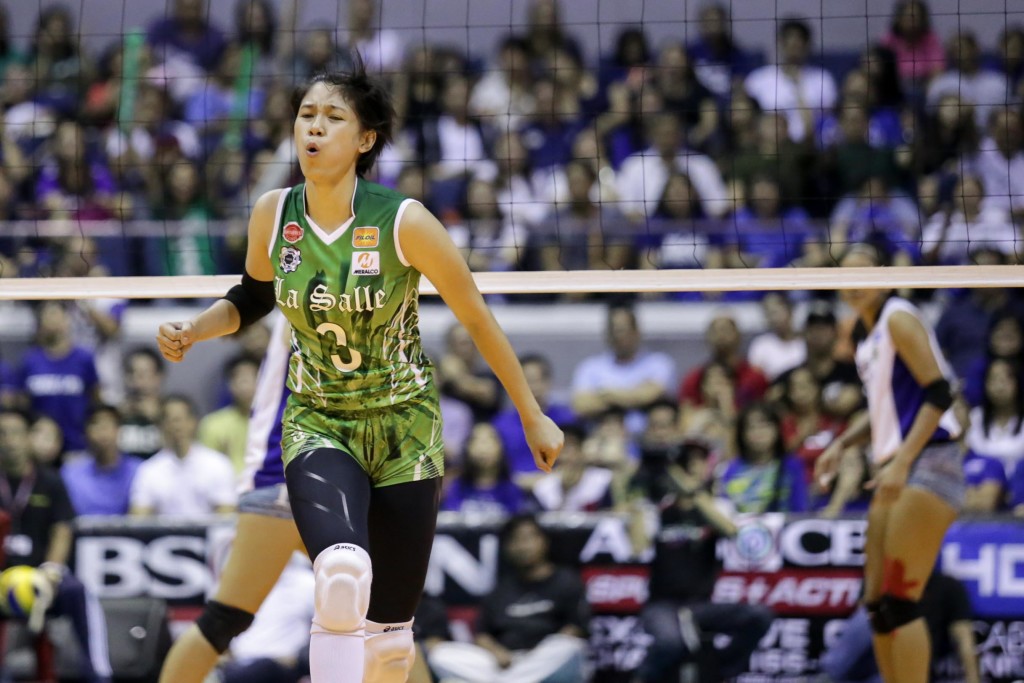Mika Reyes worked her way through the throng of adoring fans shortly after the Clash of Heroes benefit game, flashing her winsome smile and obliging everyone for quick selfies as she headed for the crowded pressroom.
She talked about how family continues to inspire her and how she pep-talked newbie setter Roselle Baliton during the game as they steered Philippine Blue team to a come-from-behind win over Philippine Red, powered by Jaja Santiago, that evening.
But it didn’t take long before she brought up the elephant in the room about the state of local volleyball, wracked as it is by the ugly rivalry between two commercial leagues.
“We know that it’s not that stable—I am not sure if that’s the correct term,” said the highly popular 5-foot-11 middle spiker. “We know that there are many disagreements, many conflicts.”
No local sport has seen a more contentious conflict than volleyball. Pundits liken the sport’s meteoric rise in popularity hereabouts to that of football, but minus the protracted power struggle among its major stakeholders.
“As a player, we don’t let these issues distract us,” Reyes said. “Our job is to make sure that we focus, keep ourselves in top condition and be ready to fight for the country.”
Reyes was voicing out her opinion on the raging conflict between the younger but dynamic Philippine Superliga and the more established Premier Volleyball League (PVL, formerly Shakey’s V-League) that has spilled to social media.
When before their bone of contention was conflicting schedules (Sunday Inquirer Sports, Page A4-3, Oct. 8, 2016), this time it’s about the foreign players who could not play in PVL clubs as reinforcements due to the delay in the release of their International Transfer Certificates (ITCs).
The delay, denounced vigorously by the PVL organizers, players and fans, forced the six competing clubs to bench their imports well into the second round of eliminations—which was bad for the league, its advertisers and the league’s television partner, ABS-CBN.
Accusations flew. League organizer Sports Vision, headed by Ricky Palou and Moying Martelino, as well as top players led by Charo Soriano, Bea Tan and Dzi Gervacio, suspected Superliga president Ramon “Tats” Suzara of meddling so that the International Volleyball Federation (FIVB) would not release the ITCs.
Suzara said he had no hand in the release of the ITCs and instead blamed the PVL for missing the FIVB’s application window for import licenses. He also demanded a public apology from Soriano and company. The tension finally eased up on Thursday after the imports finally secured the ITCs from their respective national federations.
Now what is an ITC? In essence, it is a contract required by the FIVB before a club can hire the services of a foreign player. Such a contract must be approved by the player’s home federation to ensure that it protects the player’s rights and grants fair salaries.
At the height of the import row, Suzara drew heavy flak. Considering his stature as a member of the FIVB and chief of marketing and development of the Asian Volleyball Confederation (AVC), as well as his well-publicized disputes with PVL officials, Suzara was naturally a “person of interest.”
#IbigayMoNaTatsSuzara trended online with Gervacio, Tan and Soriano leading the assault.
“You say you care for the sport, but obviously you only care about yourself. I’M DONE BEING BULLIED. Bato bato sa langit,” Gervacio wrote using her Twitter handle @dzigervacio.
“We begged. We did what we can to ask our federation for help. All for the love of Volleyball. But to no avail,” Soriano tweeted.
A member of the Philippine Olympic Committee, requesting anonymity, speculated that the row stemmed from “the continuing attempt of one major stakeholder to destroy the other, and vice versa.
“It’s very clear from the start,” said the National Sports Association official. “They will always try to kill each other over influence and sponsors’ money.”
Suzara stressed that the PVL’s schedule may have been at fault because under FIVB regulations, volleyball organizers are only allowed to employ foreign players—and request for ITCs—from Oct. 15 to May 15, the period called “club season.”
Beyond that period, he argued, no player will be released to a foreign country or club as they are deemed at the disposal of their own federations to play in international competitions.
“Either Palou was unaware of that calendar, which is well known among… serious volleyball officials or just chose to ignore it, hoping that the LVPI [Larong Volleyball ng Pilipinas, Inc., the country’s governing federation for the sport] or I would pressure the FIVB to exempt the PVL from the FIVB’s sacred rules,” Suzara said in a statement.
But Palou pointed out that, being the LVPI’s secretary general, he is well aware of FIVB regulations.
“It would be difficult to get the ITCs if the imports that we have here are the players of the national team of the other countries,” Palou argued. “But they’re not, and their clubs have released all these players to the PVL.”
He said he had tried to call an LVPI meeting but the group of Suzara and some fellow officers of the LVPI told him they were unavailable.
Citing the example of Puerto Rico, Palou insisted that the PVL could ask for an extension of the club season from the AVC and FIVB. Through LVPI acting president Peter Cayco the PVL actually asked the FIVB for an extension and, on Tuesday, received a positive reply.
In an email, FIVB president Ary Graca said they are allowing the PVL to operate until June 15—one month beyond the club season, paving the way for the immediate release of the ITCs.
The row over the import licenses may have been dealt with, but there’s no doubt that the sport and players like Reyes, Soriano, Gervacio and Tan will get the short end again when a new dispute between the PVL and the Superliga erupts in the future. —WITH A REPORT FROM TED S. MELENDRES


